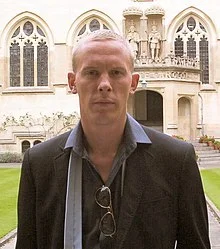
Laurence Fox
Laurence Fox is a British actor, singer-songwriter, and political figure born on May 26, 1978, in Leeds, West Yorkshire. He hails from the distinguished Fox acting dynasty, with his family boasting several accomplished performers. Laurence first gained significant public attention for his role as DS James Hathaway in the British TV series "Lewis" from 2006 to 2015. In addition to his acting career, he pursued music, releasing albums and singles showcasing his melodic and reflective style. Fox's career took a notable turn when he entered the political arena, founding the Reclaim Party in 2020. He is known for his controversial and outspoken views on cultural and political issues, which have sparked debate and garnered a mixed public reception. His multifaceted career reflects a blend of artistic talent and a contentious, often polarizing, public persona.
Jordan B. Peterson Podcast #411 – Introduction to Laurence Fox
The podcast begins with an introduction to Laurence Fox, an actor who has recently faced legal troubles in the UK due to his political stances. The discussion opens with Fox’s expression of disdain towards Sadiq Khan, the Mayor of London, and his policies, which Fox views as restrictive and detrimental to personal freedoms, particularly concerning the implementation of closed-circuit television (CCTV) cameras in London.
Legal Troubles and Political Stance
Fox details his recent arrest, which stemmed from his support for activists opposing the overuse of CCTV cameras in London. He criticizes the surveillance as excessive and an infringement on privacy and freedom, describing it as ideologically driven rather than for the public good. The podcast touches on the broader implications of his political stance, highlighting the professional and personal consequences he has faced, including disruptions in his acting career.
Freedom of Speech and Living in Truth
A significant portion of the conversation is dedicated to the importance of freedom of speech and the consequences of ideological conformity. Fox and Peterson discuss the value of speaking truthfully and the personal freedom it brings, even when it leads to societal backlash or professional setbacks. They emphasize the importance of living in truth as a means of combating ideological oppression.
Sadiq Khan and London’s Environmental Policies
The discussion shifts focus to Sadiq Khan’s environmental policies, particularly the establishment of Ultra-Low Emission Zones (ULEZ) and the push towards electric vehicles. Fox argues that these policies disproportionately affect the less affluent, exacerbating economic inequalities. He accuses Khan of suppressing reports and spreading misinformation to further his agenda.
The Cultural and Political Landscape
Fox reflects on the current cultural and political landscape, expressing a sense of impending change. He suggests that the ideological extremities are reaching a breaking point, where the general populace is beginning to reject the pervasive woke ideology and its implications on society.
Legal Battles and Societal Initiatives
Fox describes his current efforts in taking the UK government to court over what he perceives as harmful transgender policies in schools. He expresses his determination to challenge the Department of Education, seeking to prevent the teaching of material he finds objectionable. This is part of a broader initiative he calls the “Bad Law Project,” where he, along with a small team, aims to confront laws and policies they believe are detrimental to society.
Defamation Case and The Definition of Racism
Fox discusses a personal defamation case where he was accused of racism after criticizing a supermarket’s decision to create ‘safe spaces’ following George Floyd’s death. He countersued, seeking a legal definition of racism in the UK. This case is particularly significant to Fox as it ties directly into his reputation and the broader societal implications of loosely labeling individuals as racists. He awaits a judgment that he hopes will bring clarity and protection against baseless accusations of racism.
The Role of Reputation and Honesty
Fox emphasizes the importance of maintaining a good name and reputation. He reflects on the teachings from his father about the value of one’s name and how it’s all a person truly owns. This belief fuels his legal battles and his desire to confront what he sees as injustices and mischaracterizations.
Personal Repercussions and Family Impact
The podcast also touches on the personal repercussions Fox has faced due to his outspoken nature. He mentions the strain on his family, particularly an incident involving his son at school. Despite these challenges, Fox expresses a strong resolve to continue speaking out and fighting for what he believes is right.
Societal Issues and Personal Philosophy
The conversation delves into the impact of current societal issues on individuals and the importance of personal philosophy in navigating these challenges. Fox discusses his own experiences and the lessons he’s learned about honesty, integrity, and the value of a good name. He emphasizes the significance of standing up for one’s beliefs and the consequences of ideological conformity.
Cultural and Political Landscapes
The discussion also explores the future trajectory of cultural and political landscapes. Fox and Peterson contemplate the potential outcomes of the ongoing cultural war, discussing the possibilities of a peaceful resolution versus a more tumultuous one. They examine the role of humor, the importance of constructive dialogue, and the power of presenting an alternative, positive vision to counteract the prevailing negative narratives.
The Role of Education
A significant portion of the conversation is dedicated to the role of education in shaping society. Fox expresses his concerns about the current state of the educational system and its impact on the younger generation. He discusses his efforts to challenge harmful policies and advocate for a more balanced and truthful approach to education.
Conclusion and Reflections
As the podcast concludes, Fox reflects on his journey, the lessons he’s learned, and his hopes for the future. He reiterates the importance of speaking out and encourages listeners to find their voice and stand up for their beliefs. The conversation ends with a sense of cautious optimism, acknowledging the challenges ahead but also recognizing the potential for positive change.
